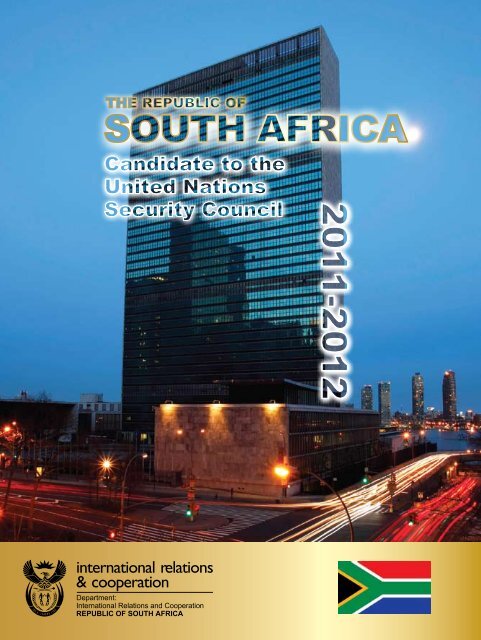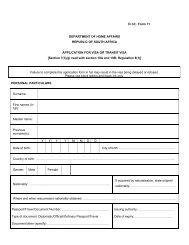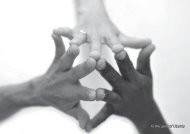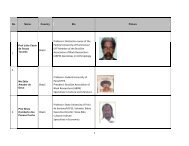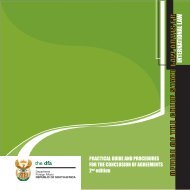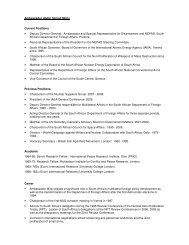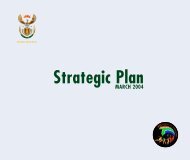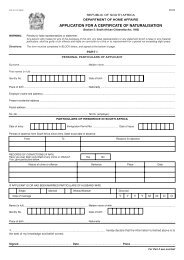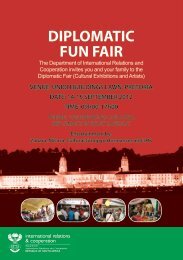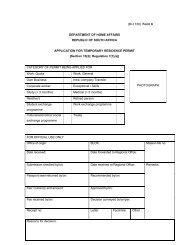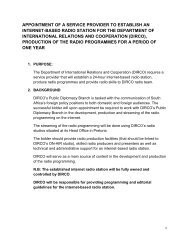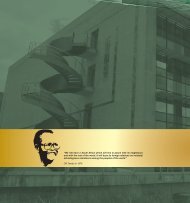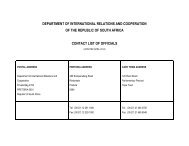South Africa - Department of International Relations and Cooperation
South Africa - Department of International Relations and Cooperation
South Africa - Department of International Relations and Cooperation
- No tags were found...
You also want an ePaper? Increase the reach of your titles
YUMPU automatically turns print PDFs into web optimized ePapers that Google loves.
The Republic <strong>of</strong> <strong>South</strong> <strong>Africa</strong>: C<strong>and</strong>idate to the United Nations Security Council 2011-2012<br />
international relations<br />
& cooperation<br />
<strong>Department</strong>:<br />
<strong>International</strong> <strong>Relations</strong> <strong>and</strong> <strong>Cooperation</strong><br />
REPUBLIC OF SOUTH AFRICA
The Republic <strong>of</strong> <strong>South</strong> <strong>Africa</strong>: C<strong>and</strong>idate to the United Nations Security Council 2011-2012<br />
The Republic <strong>of</strong> <strong>South</strong> <strong>Africa</strong>: C<strong>and</strong>idate to the United Nations Security Council 2011-2012<br />
<strong>South</strong> <strong>Africa</strong>: C<strong>and</strong>idate for election<br />
as a Non-Permanent Member <strong>of</strong> the<br />
United Nations Security Council<br />
for the Term 2011-2012<br />
S<br />
outh <strong>Africa</strong> was one <strong>of</strong> the original 51 founding members <strong>of</strong> the<br />
United Nations. The United Nations General Assembly decided on 12<br />
November 1974 to suspend <strong>South</strong> <strong>Africa</strong> from participating in its work,<br />
due to international opposition to the policy <strong>of</strong> apartheid.<br />
During the late seventies <strong>and</strong> early eighties UN Security Council sanctions were<br />
instituted against <strong>South</strong> <strong>Africa</strong> <strong>and</strong> it was barred from <strong>of</strong>ficially participating in United<br />
Nations related bodies. Financial support was also provided by the United Nations to<br />
national liberation movements. Both the <strong>Africa</strong>n National Congress (ANC) <strong>and</strong> the Pan<br />
<strong>Africa</strong>nist Congress (PAC) obtained Observer Missions at the UN with UN financial<br />
support. <strong>South</strong> <strong>Africa</strong> remained on the agenda <strong>of</strong> both the UN General Assembly <strong>and</strong><br />
the Security Council during the struggle against apartheid.<br />
The democratic elections in <strong>South</strong> <strong>Africa</strong> in April 1994 paved the way for the complete<br />
normalisation <strong>of</strong> <strong>South</strong> <strong>Africa</strong>’s relations with the UN. Since then <strong>South</strong> <strong>Africa</strong> has<br />
participated actively in all aspects <strong>of</strong> the work <strong>of</strong> the Organisation. Its global status<br />
has increased significantly through participation in numerous UN bodies, agencies<br />
<strong>and</strong> General Assembly sessions. The role <strong>of</strong> the UN <strong>and</strong> the international community<br />
during the fight against Apartheid instilled a firm belief in <strong>South</strong> <strong>Africa</strong>ns <strong>of</strong> the value <strong>of</strong><br />
multilateralism <strong>and</strong> the UN system.<br />
Democratic <strong>South</strong> <strong>Africa</strong> is thus a strong supporter <strong>of</strong> multilateralism <strong>and</strong> respects the<br />
current system <strong>of</strong> governance based on the United Nations <strong>and</strong> its various bodies.<br />
These institutions serve to combine the international community’s strength to maintain<br />
international peace <strong>and</strong> security <strong>and</strong> employ multilateral institutions for the promotion<br />
The first<br />
democratically<br />
elected<br />
President <strong>of</strong><br />
the Republic <strong>of</strong><br />
<strong>South</strong> <strong>Africa</strong>,<br />
Mr Nelson<br />
M<strong>and</strong>ela,<br />
addressing<br />
the Special<br />
Committee<br />
against<br />
Apartheid in<br />
the General<br />
Assembly Hall,<br />
22 June 1990<br />
<strong>of</strong> the economic <strong>and</strong> social well-being <strong>and</strong> advancement <strong>of</strong> all peoples. <strong>South</strong> <strong>Africa</strong><br />
is also <strong>of</strong> the view that this is the legitimate <strong>and</strong> credible system through which other<br />
major global issues such as food security, disasters, refugees, international crime <strong>and</strong><br />
disarmament could be effectively addressed in a collective manner.<br />
In October 2006, <strong>South</strong> <strong>Africa</strong> was elected by the Members <strong>of</strong> the General Assembly to<br />
serve, for the first time in its history, as a non-Permanent Member <strong>of</strong> the Security Council<br />
for the period 2007-2008. The election to the Council <strong>of</strong>fered <strong>South</strong> <strong>Africa</strong> the opportunity<br />
to advance the <strong>Africa</strong>n agenda <strong>of</strong> achieving peace, security <strong>and</strong> development, including<br />
respect for human rights. <strong>South</strong> <strong>Africa</strong> also regards the Security Council as a platform to<br />
help promote multilateralism <strong>and</strong> respect for international law as the most appropriate<br />
means <strong>of</strong> achieving global political <strong>and</strong> economic stability <strong>and</strong> security.<br />
The 14 th Ordinary Session <strong>of</strong> the <strong>Africa</strong>n Union held in Addis Ababa on 31 January –<br />
2 February 2010 endorsed <strong>South</strong> <strong>Africa</strong>’s c<strong>and</strong>idature as <strong>Africa</strong>’s c<strong>and</strong>idate for the nonpermanent<br />
seat on the United Nations Security Council for the period 2011-2012.<br />
<strong>South</strong> <strong>Africa</strong>’s c<strong>and</strong>idature for 2011-2012 will be guided by its commitment to<br />
strengthening the multilateral system <strong>and</strong> its support for a broader multilateral approach<br />
to questions <strong>of</strong> international peace <strong>and</strong> security.<br />
1 2
The Republic <strong>of</strong> <strong>South</strong> <strong>Africa</strong>: C<strong>and</strong>idate to the United Nations Security Council 2011-2012<br />
The Republic <strong>of</strong> <strong>South</strong> <strong>Africa</strong>: C<strong>and</strong>idate to the United Nations Security Council 2011-2012<br />
Principles <strong>of</strong> <strong>South</strong> <strong>Africa</strong>’s<br />
Foreign Policy<br />
• a commitment to international peace <strong>and</strong> to regional <strong>and</strong><br />
internationally agreed upon mechanisms for the resolution <strong>of</strong><br />
conflicts;<br />
• a commitment to justice <strong>and</strong> international law;<br />
• a commitment to the promotion <strong>of</strong> democracy;<br />
• a commitment to the promotion <strong>of</strong> human rights; <strong>and</strong><br />
• a commitment to the <strong>Africa</strong>n Continent.<br />
The President <strong>of</strong> the Republic <strong>of</strong> <strong>South</strong> <strong>Africa</strong>, Mr Jacob Zuma, addressing the United Nations General<br />
Assembly, 23 September 2009<br />
Former President <strong>of</strong> the Republic <strong>of</strong> <strong>South</strong> <strong>Africa</strong>, Mr Thabo Mbeki, addressing a High-Level meeting<br />
<strong>of</strong> the United Nations Security Council on Peace <strong>and</strong> Security in <strong>Africa</strong>, 25 September 2007<br />
S<br />
outh <strong>Africa</strong>n foreign policy aims to help forge an <strong>Africa</strong>n<br />
continent that is prosperous, peaceful, democratic, nonracial,<br />
non-sexist <strong>and</strong> united <strong>and</strong> which contributes to a world<br />
that is just <strong>and</strong> equitable.<br />
In the conduct <strong>of</strong> its foreign policy, <strong>South</strong> <strong>Africa</strong> is guided by <strong>and</strong> upholds<br />
the following principles:<br />
Former President <strong>of</strong> the Republic <strong>of</strong> <strong>South</strong> <strong>Africa</strong>, Mr Kgalema Motlanthe (right), holding<br />
talks with UN Secretary-General Ban Ki-moon (left), 25 February 2009<br />
3 4
The Republic <strong>of</strong> <strong>South</strong> <strong>Africa</strong>: C<strong>and</strong>idate to the United Nations Security Council 2011-2012<br />
The Republic <strong>of</strong> <strong>South</strong> <strong>Africa</strong>: C<strong>and</strong>idate to the United Nations Security Council 2011-2012<br />
Why does <strong>South</strong> <strong>Africa</strong> seek<br />
election to the United Nations<br />
Security Council<br />
• Guided by its own national experience in transforming peacefully from<br />
apartheid <strong>and</strong> isolation to democracy, <strong>South</strong> <strong>Africa</strong> would utilise its own<br />
experiences in the prioritisation <strong>of</strong> diplomacy, inclusivity <strong>and</strong> transparency<br />
<strong>and</strong> working to assist parties to achieve unity <strong>and</strong> national reconciliation;<br />
• Since 1994 <strong>South</strong> <strong>Africa</strong> has played a substantial role in the maintenance<br />
<strong>of</strong> international peace <strong>and</strong> security, inter-alia, through active participation in<br />
UN <strong>and</strong> regional peacekeeping missions; mediation efforts to secure peace<br />
in a number <strong>of</strong> conflict areas, particularly on the <strong>Africa</strong>n Continent; <strong>and</strong><br />
co-operation with United Nations bodies that promote international peace<br />
<strong>and</strong> security.<br />
The United Nations Security Council in session<br />
• Membership <strong>of</strong> the Security Council affords <strong>South</strong> <strong>Africa</strong> an opportunity<br />
to contribute to promoting multilateralism <strong>and</strong> respect for international law<br />
as the most appropriate means <strong>of</strong> achieving global political stability <strong>and</strong><br />
security;<br />
• It also provides <strong>South</strong> <strong>Africa</strong> an opportunity to play an enhanced role in<br />
contributing to the work <strong>of</strong> the United Nations in the maintenance <strong>of</strong><br />
international peace <strong>and</strong> security;<br />
Minister <strong>of</strong> <strong>International</strong> <strong>Relations</strong> <strong>and</strong> <strong>Cooperation</strong> <strong>of</strong> the Republic <strong>of</strong> <strong>South</strong> <strong>Africa</strong>, Ms Maite<br />
Nkoana-Mashabane, addressing the United Nations Conference on the World Financial <strong>and</strong><br />
Economic Crises <strong>and</strong> its Impact on Development, 24 June 2009<br />
5 6
The Republic <strong>of</strong> <strong>South</strong> <strong>Africa</strong>: C<strong>and</strong>idate to the United Nations Security Council 2011-2012<br />
The Republic <strong>of</strong> <strong>South</strong> <strong>Africa</strong>: C<strong>and</strong>idate to the United Nations Security Council 2011-2012<br />
What would <strong>South</strong> <strong>Africa</strong><br />
do on the Security Council<br />
if elected<br />
• Promote the <strong>Africa</strong>n Agenda, including the highlighting <strong>of</strong> the continent’s<br />
priorities in the area <strong>of</strong> peace <strong>and</strong> security;<br />
• Continue to work together with all the members <strong>of</strong> the <strong>South</strong>ern <strong>Africa</strong>n<br />
Development Community, the <strong>Africa</strong>n Union <strong>and</strong> United Nations in pursuit<br />
<strong>of</strong> effective global governance, multilateralism <strong>and</strong> the reform <strong>of</strong> the United<br />
Nations system;<br />
• Work towards improving the working methods <strong>of</strong> the Security Council to<br />
make it a more legitimate, representative <strong>and</strong> effective body.<br />
Deputy Minister <strong>of</strong> <strong>International</strong> <strong>Relations</strong> <strong>and</strong> <strong>Cooperation</strong> <strong>of</strong> the Republic <strong>of</strong> <strong>South</strong> <strong>Africa</strong>,<br />
Mr Ebrahim Ismail Ebrahim, addressing the United Nations Security Council at a debate on<br />
Post-Conflict Peacebuilding, 22 July 2009<br />
• Contribute to achieving peace <strong>and</strong> stability in the continent <strong>and</strong> in all regions<br />
<strong>of</strong> the world;<br />
• Continue to promote the importance <strong>of</strong> developing effective partnerships<br />
between the United Nations <strong>and</strong> regional <strong>and</strong> sub-regional organisations in<br />
maintaining international peace <strong>and</strong> security;<br />
Deputy Minister <strong>of</strong> <strong>International</strong> <strong>Relations</strong> <strong>and</strong> <strong>Cooperation</strong> <strong>of</strong> the Republic <strong>of</strong> <strong>South</strong> <strong>Africa</strong>,<br />
Ms Sue van der Merwe, addressing the United Nations Security Council at a debate on<br />
Security Sector Reform, 12 May 2008<br />
7 8
The Republic <strong>of</strong> <strong>South</strong> <strong>Africa</strong>: C<strong>and</strong>idate to the United Nations Security Council 2011-2012<br />
The Republic <strong>of</strong> <strong>South</strong> <strong>Africa</strong>: C<strong>and</strong>idate to the United Nations Security Council 2011-2012<br />
<strong>South</strong> <strong>Africa</strong>’s Contribution<br />
to the UN System<br />
<strong>South</strong> <strong>Africa</strong>n Observer Mission to the Elections<br />
in Timor-Leste, June 2007<br />
The <strong>South</strong> <strong>Africa</strong>n maritime contingent <strong>of</strong> the<br />
United Nations Operation in Burundi (ONUB)<br />
during a medal parade in Bujumbura, Burundi,<br />
27 October 2006<br />
• Significant contributor to United Nations Peacekeeping Operations. To<br />
date, <strong>South</strong> <strong>Africa</strong> has contributed troops to UN Peacekeeping forces in the<br />
Democratic Republic <strong>of</strong> the Congo, Burundi, Sudan, <strong>and</strong> Nepal;<br />
• Since 1994, <strong>South</strong> <strong>Africa</strong> has inter-alia, chaired the following international<br />
bodies:<br />
• Non-Aligned Movement,<br />
• Commonwealth,<br />
• <strong>Africa</strong>n Union,<br />
• G77 <strong>and</strong> China.<br />
<strong>South</strong> <strong>Africa</strong>n troops participating in UN Peacekeeping Operations<br />
• <strong>South</strong> <strong>Africa</strong> has also hosted the following UN Conferences:<br />
• World Summit on Sustainable Development;<br />
• World Conference against Racism.<br />
9 10
The Republic <strong>of</strong> <strong>South</strong> <strong>Africa</strong>: C<strong>and</strong>idate to the United Nations Security Council 2011-2012<br />
Produced by: The <strong>Department</strong> <strong>of</strong> <strong>International</strong><br />
<strong>Relations</strong> <strong>and</strong> <strong>Cooperation</strong> <strong>of</strong> the Republic <strong>of</strong> <strong>South</strong> <strong>Africa</strong><br />
Coordinated by: Chief Directorate - United Nations<br />
Design <strong>and</strong> Layout by: Branch - Public Diplomacy


